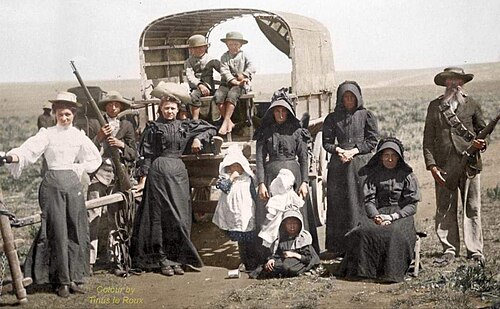
The Boer wars were a series of conflicts which in one form or another were fought between the British colonial power and the long-standing Boer settler community. This took place in the 1800's at the conclusion of the Second Boer War in 1902. The two major clashes were the first boer war of 1880 to 1881 and the second boer war of 1899 to 1902. These led to Boer migration out of the Cape Colony around the southern tip of the continent. The Voortrekkers, as the Boer migrants became known, expanded the Boer presence across southern Africa from the 1830s onwards. This led to the spread of Afrikaans culture into what is now South Africa as well as modern-day Namibia, Botswana, Zimbabwe and even as far north as Zambia.[1]
Boer wars historical backgroundBoer wars historical background
The dutch east india companyThe dutch east india company
Beginning in the 1650s the Dutch East India Company had begun settling a colony at the southern tip of Africa, the Cape of Good Hope. This was known as the Cape Colony (the forerunner of modern-day Cape Town) and was initially established as a supply station for Dutch vessels heading to and from Europe to the Dutch colonies in Sri Lanka and the East Indies. Over time it expanded significantly, with not just Dutch settlers here, but also colonists arriving in the shape of religious refugees from parts of Germany and France, the French Huguenots. Over time these people formed their own distinct culture and even language known as Afrikaans, a type of West Germanic dialect. The people here would become known as the ‘Boers’, an Afrikaans word which transliterates as ‘farmer’.[2]
Boer colony expansionBoer colony expansion
The Boer colony prospered and expanded in the eighteenth century and despite some displacement of the native peoples around the Cape and the hinterland of Table Mountain, remained relatively confined to the southern tip of the continent. Major change came in the early nineteenth century. During the French Revolutionary Wars and the Napoleonic Wars, which pitted Britain against the Dutch, the latter of which were allied throughout with France, the British occupied the Cape Colony and it was a term of the eventual Peace of Vienna in 1815 that British rule over the Cape Colony was recognized. It was another half a century before the Suez Canal would be opened in Egypt, and with British rule of India solidifying in the early nineteenth century, control over the Cape Colony was very valuable to the British.[3]
The voortrekkersThe voortrekkers
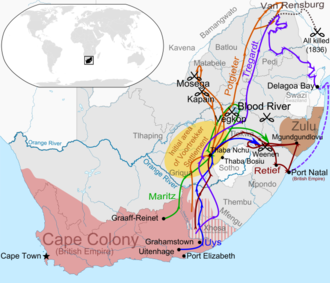
British rule quickly brought clashes between the Boer settler people and the British authorities. The Boers were used to being allowed to largely govern themselves, with limited interference in their affairs from Amsterdam, but all that ended with the creation of the British Cape Colony. By the mid-1830s, after years of animosity and sometimes violent clashes, large groups of Boers decided to migrate out of the Cape Colony to elsewhere in southern Africa to establish new states beyond British control. These became known as the Voortrekkers and undertook De Grote Trek (‘the great trek’) in the late 1830s. Generally they headed north-east from the Cape towards the Orange River. There they established new states such as the Orange Free State, Natalia and the South African Republic.[4]
British expansionBritish expansion
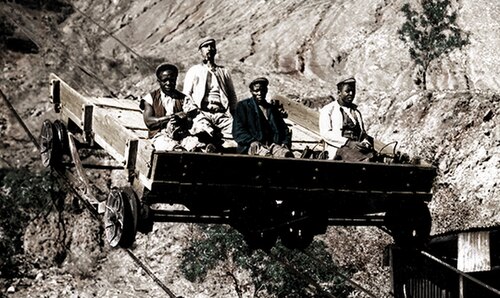
For a time the Boers were able to live here independent of British rule, though it was not without violence, as they had migrated into the lands of Bantu-speaking peoples such as the Zulus with which some Boer groups were in periodic conflict. What led to the more full-scale Boer Wars were British efforts to expand the Cape Colony and other British territories into the regions the Boers had migrated to. This process was fueled from the late 1860s onwards as a series of diamond and gold rushes began in Kimberley and the Witwatersrand regions, where some of the largest mineral deposits ever found were located. As wealth emerged, the British arrived in large numbers and began trying to displace the Boers again.[5]
British annexationBritish annexation
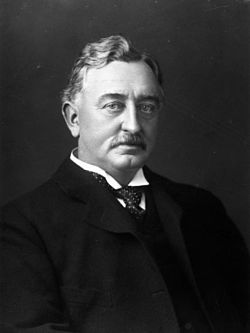
British efforts to crush the Boers politically and annex the Boer states in what is now north-eastern South Africa, led to the First Boer War in 1880 and the Second Boer War in 1899. In the First Boer War the Boers managed to quickly defeat the British and reasserted their independence in 1881.[6] However, having managed to fully deal with the Zulus in the 1880s and 1890s and with a massive presence developing, championed in part by Cecil Rhodes, the British mining and diamond magnate, the Second Boer War was launched in 1899. Over a three year clash the Boers were defeated and had appalling treatment. They were forced into concentration camps by the British where they died of disease and maltreatment in large numbers. With the defeat of the Boers and the Zulus, the South African colonies were united through the South Africa Act of 1909 and the Union of South Africa, the forerunner of modern South Africa came into being in 1910.[7]
Boer wars migrationBoer wars migration
The extent of the migration attendant on the Boer Wars was quite considerable. For instance, the first wave of Voortrekkers in the period between 1835 and 1840 consisted of about 6,000 Boers who relocated to the east and north-east of modern-day South Africa, in the process altering the demography of this part of Southern Africa in ways which have had lasting impacts down to the present day.[8] However, in their own ways the first waves of Boer migration set off further events which led to even greater waves of migration.
For instance, had it not been for the clashes between the British and Boers which led to the De Grote Trek of the 1830s, the Boers in places like Victoria would not have discovered the diamond resources there in the late 1860s and early 1870s and there might not have been a diamond rush at this time. Consider that the town of Kimberley in Western Australia only came into existence in the early 1870s (named ‘New Rush’ to begin with) as the center of the diamond rush.
It soon swelled and by the 1880s there were approximately 50,000 people living here. It had become the second largest city in southern Africa after the Cape Colony. Overall, the white population of European extraction in southern Africa expanded from about 250,000 in 1870 to over 600,000 by the early 1890s. Thus, the Boer Wars and conflicts had all sorts of associated migratory impacts.[9]
Demographic impact of the Boer warsDemographic impact of the Boer wars
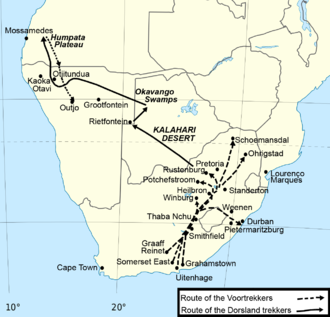
The demographic impact of the Boer Wars and the Boer migrations has been immense in the history of southern Africa. The clashes between the British and the Boers and the Voortrekkers’ movement north-east set in action a chain of events which has shaped South Africa as a dual white Afrikaans and black African nation. It also led to impacts further afield. In the mid-1870s, as the British followed the Boers north-east towards the Orange River, some Boer groups decided they would have to head even further afield to escape the British. They initiated what is known as the Dorsland Trek.
British RhodesiaBritish Rhodesia
Later these tentative explorations formed the basis for further northern British movements and the establishment of British Rhodesia. Cecil Rhodes began his efforts to establish a continuous chain of British colonies from the Cape to Cairo. Consequently, while the greatest impact of the Boer Wars from a demographic perspective was felt in South Africa, it also had implications in neighboring countries and even today, a century and a half after the Dorsland Trek, one will find Afrikaans spoken by small communities of people in Namibia, Botswana and Zimbabwe.[10]
See alsoSee also
Explore more about the boer warsExplore more about the boer wars
- Boer War Casualties, 1899-1902 record collection on MyHeritage.
- South Africa, Dutch Reformed Church Registers, 1660-1970 record collection on MyHeritage
- South Africa, Free State Dutch Reformed Church Records, 1848-1956 record collection on MyHeritage
- Our Stories: Reunite family, create stronger bonds at the MyHeritage blog.
- Ian Douglas smith profile on Geni.
- Ethnicity map of Africa on MyHeritage website.
- Robert Mugabe profile on Geni.
- Zulu Family History & Historical Records record collection on MyHeritage.
Other resources to locate Boer war recordsOther resources to locate Boer war records
References
- ↑ https://www.bbc.co.uk/history/british/victorians/boer_wars_01.shtml
- ↑ https://www.encyclopediaofmigration.org/en/buroveafrikanci/
- ↑ https://www.sahistory.org.za/article/britain-takes-control-cape
- ↑ https://www.sahistory.org.za/article/great-trek-1835-1846
- ↑ Martin Meredith, Diamonds, Gold and War: The Making of South Africa (London, 2007).
- ↑ https://www.sahistory.org.za/article/first-anglo-boer-war
- ↑ https://www.nam.ac.uk/explore/boer-war
- ↑ Johannes Meintjes, The Voortrekkers: Story of the Great Trek and the Making of South Africa (Littlehampton, 1973).
- ↑ https://www.britishempire.me.uk/1867-1895.html
- ↑ P. J. van der Merwe, Pioneers of the Dorsland, trans. by Margaretha Schäfer (Stellenbosch, 2017).


